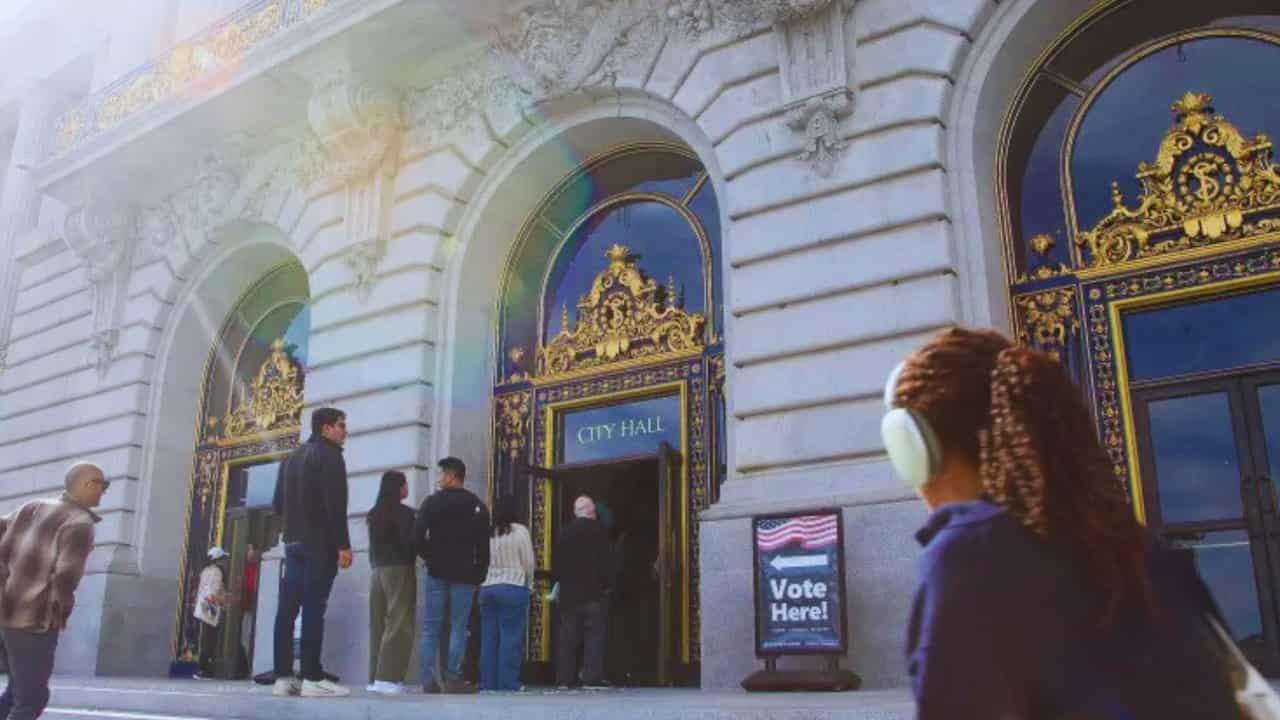Democracy at the Crossroads: San Francisco Voters Voice Their Vision for America’s Future
In the heart of America’s most populous Democratic stronghold, San Francisco voters turned out in force yesterday, bringing their diverse concerns to the historic City Hall polling station.
As Vice President Kamala Harris, the city’s former district attorney, vies for the presidency, local voters weigh in on issues ranging from reproductive rights to economic recovery.
Under the gleaming gold dome of San Francisco’s City Hall, where Harris once served as district attorney from 2002 to 2011, voters lined up alongside wedding parties, embodying the intersection of personal milestones and civic duty. The scene was particularly meaningful given California’s significant role in the electoral process, wielding 54 Electoral College votes.
Economic Recovery Takes Center Stage
Small business advocates Matt Fitzgerald and Maddie Dunn highlighted the city’s struggling economic recovery. “San Francisco’s had the slowest COVID recovery in North America,” Fitzgerald noted, pointing to the stark reality of empty storefronts dotting the downtown landscape. The city lost nearly 65,000 residents during the pandemic, dealing a heavy blow to local businesses.
Housing Crisis Continues to Shape Local Politics
The ongoing housing crisis emerged as a crucial factor for many voters. Jennifer Fieber, a member of the San Francisco Tenants Union, emphasized that tenants make up 64% of the city’s population.
“If you stabilize their housing, it has a profound effect on the working class and the ability of people to live in the city,” she explained. The city’s latest reports indicate at least 8,323 residents face homelessness, with over 20,000 seeking assistance annually.
Democracy and Civil Rights at the Front
Anjali Rimi, a social service worker, voiced concerns about broader democratic principles. “What’s at stake is democracy,” she declared. “What’s at stake are the lives of immigrants, minority-religion people, and the fundamental rights of every human being.” These sentiments reflected wider anxieties about the direction of national politics.
Reproductive rights and healthcare access
For Melanie Matthewson, a 26-year-old political consultant, reproductive rights topped the list of priorities. “I would love to have children one day, and I want to make sure, no matter where I live or where they choose to live, they have access to whatever healthcare that they need for their bodies,” she stated. The 2022 overturning of Roe v. Wade continues to influence voter decisions.
Climate Change and Urban Planning
Environmental concerns also shaped voter priorities. Joshua Kelly, a stay-at-home dad, advocated for transforming the Great Highway into a park and promenade, highlighting the intersection of local planning and climate change.
“Do we want to be a city that acknowledges and embraces climate change and plans for it?” he asked, connecting local infrastructure decisions to national climate policy.
Looking Ahead
Voters in San Francisco, reflecting the complex challenges facing American democracy, expressed a mix of local and national concerns as the ballots continue to count. From economic recovery to civil rights, from reproductive healthcare to climate change, voters emphasized the interconnected nature of local and national issues.
The election results will not only shape San Francisco’s future but could influence national politics, given California’s significant electoral weight and Vice President Harris’s deep ties to the region. One voter observed that this election signifies a significant turning point for American democracy.
